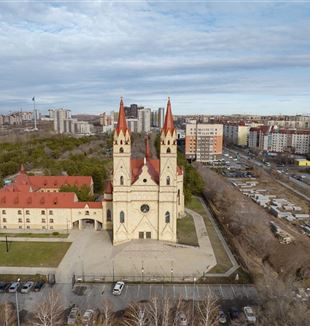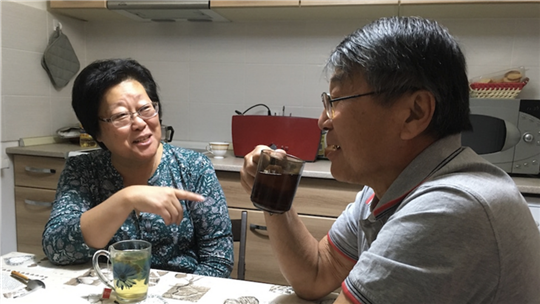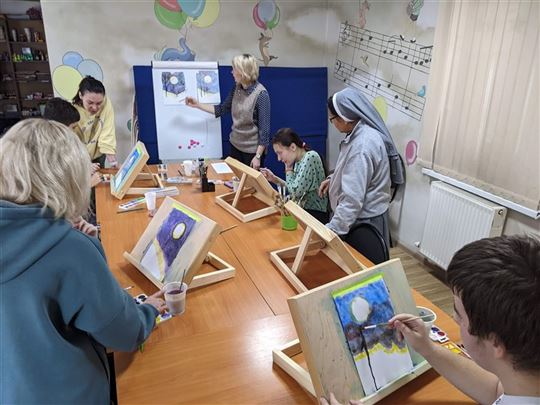
Kazakhstan: Thirty years since the beginning
The CL community was born in the country in 1994. An unpredictable story, today more alive than ever, as testified by Lyubov. She speaks of ‘The Lighthouse’, an aid centre for young people with disabilities.In 1994, several Italian priests from Communion and Liberation went on mission to Kazakhstan. The first were Fr. Edoardo Canetta and Fr. Massimo Ungari, who were later joined by Fr. Eugenio Nembrini, Fr. Livio Lodigiani, Fr. Giuseppe Venturini, Fr. Adelio Dell'Oro, and Fr. Pierluigi Callegari. They settled in Almaty, Astana and Karaganda. Today many of them have returned to Italy and only Monsignor Dell'Oro remains in the country, but the CL community is more alive than ever. The story is recounted by Lyubov Khon, who is 66 years old and has been the responsible for CL in Karaganda for some time, a city founded in 1926 by the prisoners of what was the country's largest gulag. “I thank God because in all these years we have never been alone and the presence of the movement is alive through following the Church, the gestures of the School of Community, the common fund, the cultural and charitable dimension. Charitable work continues to be crucial for all of us today. In recent years, ‘The Lighthouse’, an aid centre for young people with frailties, has been born in Karaganda.”
The Lighthouse, he says, is the result of a long education. Since their arrival, in fact, the missionaries proposed to her, and to everyone they met, to dedicate their time gratuitously to keeping children from poor families in the suburbs company. “So we started doing charitable work in a psychiatric boarding school and in a home run by the Sisters of Mother Teresa. Right from the start, my children learned to be faithful to that gesture, and that fidelity has remained over time. So much so that even when our priest friends had to leave Karaganda, they were the ones who continued the charitable work in an almost natural way.” In the decades that followed, however, many circumstances changed, as both priests and several young families moved to Europe for various reasons.
“Since June 2020, the privileged place of charitable work has become a house that we had rented from Caritas to house our friend Galia, who was ill with cancer. Galia was already terminally ill and was living in a terrible room, as she came from an orphanage and had no family. It was the height of the pandemic and we decided to find a place where she could live those last months of her life not alone. We organized ourselves: we took shifts, prepared her food, visited her every day, and even hired a nurse at night. It was good and also difficult, because she was resistant to everything we did. When visiting her we had to ask ourselves: why are we doing this? Who are we looking at? Who are we serving through Galia's needs? It was not easy to bear her insults and we always asked Fr. Adelio for help, because we wanted to be able to look at her with mercy.”
In June of the same year, another friend of the movement, Olga, died of cancer. “It was decisive for us to accompany Galia having Olga’s last months in our eyes and hearts. I remember a moving meeting Olga had with Fr. Carrón in Vilnius, Lithuania, shortly before she died. Her testimony of faith, so clear and certain, had moved us all. There we realized that we had expected the same from Galia. But Galia is not Olga, and through her Jesus has given us the opportunity to serve Him without expecting gratitude and understanding, to serve her suffering and pain, learning gratitude by being able to wash her wounds and accompany her as she struggled to accept her illness. In August, Galia went to heaven. The day after the funeral, my friends and I went to clean her house and invited the director of Caritas for tea.” Unexpectedly, he proposed that they manage the space in order to offer a kind of after-school programme for local teenagers. “I am still amazed at the way Mystery works. In those same days, Fr. Adelio had spoken to us about the possibility of setting up a social centre because there is unused land next to the Cathedral and there is a great need to look after our young people, who are very often fragile and alone.” Monsignor Francis Assisi Chullikatt, Apostolic Nuncio to Kazakhstan, also showed interest in the idea. On one of his visits he had visited the Youth Centre in Almaty, created thanks to the commitment of the priests of the movement and now led by a Memor Domini, Silvia Galbiati, and was fascinated by it. Supported by all these signs, the friends of Karaganda followed the impulse of their hearts, and on September 17, 2020, The Lighthouse was born.
The first to be welcomed into the facility – which is still in the Caritas premises, but work will soon begin on a new and larger centre in front of the Cathedral – were seven boys from a school for children with special needs that had closed because of Covid. “We began by meeting on Saturdays. Now the activities have grown and cover the whole week: twenty boys attend the centre, with different disabilities. None of them can study or work independently, so they come to the Lighthouse to take courses in music, cooking, English, physical education, creativity. We also wanted a common moment where we sing, dance, and drink tea together. On Tuesdays there are individual lessons to try to meet the needs of each child, while Thursdays are our ‘special day’: we welcome them for half a day so that their mothers are free to have a few hours to themselves, to work, do the shopping or the housework.” One of the first problems at the beginning was the lack of specialized disability teachers, so people of good will, but who were not trained, began to work at the centre. In December 2022, at the request of Monsignor Dell'Oro, two Cottolengo sisters arrived in Karaganda from India. They have been caring for children with disabilities for more than 20 years and their experience, strengthened by a deep yet simple faith, makes them a unique resource for The Lighthouse. Lyubov is enthusiastic about this new piece of history that she sees unfolding before her eyes. “The Lighthouse is the fruit of a 30-year journey of our CL community in Karaganda, a journey that has turned my life upside down, as it has that of my family, my students, so many friends and colleagues.”
The lives of some mothers who have entrusted their children to the Lighthouse over the past four years are also being turned upside down. Like Ioanna's mother. “I already had four children when I found out I was expecting her. She was not expected. At the time of delivery, the doctors told me that the baby was born, she was healthy but had Down’s syndrome and so they suggested I leave her there. My world fell apart, but I did not think for a moment about leaving her. The following years were terrible, I thought I had to preserve her and hide her from the eyes of the world. Then I found The Lighthouse. There, Ioanna is loved, welcomed, and so are we. Unfortunately, in our city there is no government institution where children with special needs can meet and grow up in safety and love. We found all this at the Lighthouse and with great hope we await the construction of a new centre, a big home for our children.” Another woman, the mother of a boy who has been attending the centre for about a year, echoes her. “There is a strange Presence here, which we do not know, but which we experience and which is changing our lives and our way of looking at all reality.”
Read also - "I took you as Mine"
The children have many needs, as well as material ones: Caritas pays the rent and bills for the centre, but it is not easy to find funding for the new premises, nor for the materials needed for all the activities. The project for the future centre, Lyubov explains, is estimated at around one million euros. “The figure is high, we know that. But so is the generosity of the people. Divine providence works faithfully. There are friends from Kazakhstan and Italy who have contributed. This year some of our mothers decided to make a donation to The Lighthouse, despite the fact that almost all of them come from simple families, often without husbands. I am learning over these years to ask and be humble in the face of our needs, confident that, if God wanted this work, He will make it continue.” She says she is certain because that is exactly what she has seen happen in her life. “I have been a teacher of Russian language and literature for more than 30 years. My husband and I have always worked hard: me in school and him in the mines. My children grew up without me. Like us, they too encountered the movement, but in 2016 one son and his family left to live and work in Italy, in 2018 another left for Germany. A tremendous tear in my heart as a mother. So much so that after my first visit to Germany, back in Karaganda, I ran to Fr. Adelio in tears, asking him what I could live for, with my children so far away. He replied that the question of vocation never ends for a person. Another friend invited me to look at my students as my children and not to get tired of asking Jesus. I did not know then that He would answer me by giving me the experience of The Lighthouse, entrusting me these children with special needs and their mothers, through whom Jesus embraces me, caresses me, desires me, prefers me.”